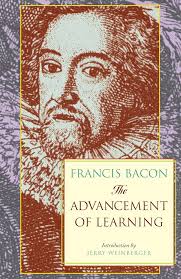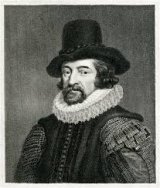The Advancement of Learning Page #25
The Advancement of Learning, published by Francis Bacon in 1605, is a foundational text in the history of science and philosophy. In this work, Bacon advocates for empirical research and the systematic organization of knowledge, laying the groundwork for the scientific method. The book critiques existing scholarly practices and proposes a new approach to learning based on observation and experimentation. It marks a significant shift towards modern scientific inquiry.
- Year:
- 1605
- 1,168 Views
Submitted by acronimous on August 11, 2024
Modified by acronimous on August 11, 2024
ancient mother name of Britain, as a full period of all instability and peregrinations. So that as it cometh to pass in massive bodies, that they have certain trepidations and waverings before they fix and settle, so it seemeth that by the providence of God this monarchy, before it was to settle in your majesty and your generations (in which I hope it is now established for ever), it had these prelusive changes and varieties. (9) For lives, I do find strange that these times have so little esteemed the virtues of the times, as that the writings of lives should be no more frequent. For although there be not many sovereign princes or absolute commanders, and that states are most collected into monarchies, yet are there many worthy personages that deserve better than dispersed report or barren eulogies. For herein the invention of one of the late poets is proper, and doth well enrich the ancient fiction. For he feigneth that at the end of the thread or web of every man’s life there was a little medal containing the person’s name, and that Time waited upon the shears, and as soon as the thread was cut caught the medals, and carried them to the river of Lathe; and about the bank there were many birds flying up and down, that would get the medals and carry them in their beak a little while, and then let them fall into the river. Only there were a few swans, which if they got a name would carry it to a temple where it was consecrate. And although many men, more mortal in their affections than in their bodies, do esteem desire of name and memory but as a vanity and ventosity, “Animi nil magnæ laudis egentes;” which opinion cometh from that root, Non prius laudes contempsimus, quam laudanda facere desivimus: yet that will not alter Solomon’s judgment, Memoria justi cum laudibus, at impiorum nomen putrescet: the one flourisheth, the other either consumeth to present oblivion, or turneth to an ill odour. And therefore in that style or addition, which is and hath been long well received and brought in use, felicis memoriæ, piæ memoriæ, bonæ memoriæ, we do acknowledge that which Cicero saith, borrowing it from Demosthenes, that bona fama propria possessio defunctorum; which possession I cannot but note that in our times it lieth much waste, and that therein there is a deficience. (10) For narrations and relations of particular actions, there were also to be wished a greater diligence therein; for there is no great action but hath some good pen which attends it. And because it is an ability not common to write a good history, as may well appear by the small number of them; yet if particularity of actions memorable were but tolerably reported as they pass, the compiling of a complete history of times might be the better expected, when a writer should arise that were fit for it: for the collection of such relations might be as a nursery garden, whereby to plant a fair and stately garden when time should serve. (11) There is yet another partition of history which Cornelius Tacitus maketh, which is not to be forgotten, specially with that application which he accoupleth it withal, annals and journals: appropriating to the former matters of estate, and to the latter acts and accidents of a meaner nature. For giving but a touch of certain magnificent buildings, he addeth, Cum ex dignitate populi Romani repertum sit, res illustres annalibus, talia diurnis urbis actis mandare. So as there is a kind of contemplative heraldry, as well as civil. And as nothing doth derogate from the dignity of a state more than confusion of degrees, so it doth not a little imbase the authority of a history to intermingle matters of triumph, or matters of ceremony, or matters of novelty, with matters of state. But the use of a journal hath not only been in the history of time, but likewise in the history of persons, and chiefly of actions; for princes in ancient time had, upon point of honour and policy both, journals kept, what passed day by day. For we see the chronicle which was read before Ahasuerus, when he could not take rest, contained matter of affairs, indeed, but such as had passed in his own time and very lately before. But the journal of Alexander’s house expressed every small particularity, even concerning his person and court; and it is yet a use well received in enterprises memorable, as expeditions of war, navigations, and the like, to keep diaries of that which passeth continually. (12) I cannot likewise be ignorant of a form of writing which some grave and wise men have used, containing a scattered history of those actions which they have thought worthy of memory, with politic discourse and observation thereupon: not incorporate into the history, but separately, and as the more principal in their intention; which kind of ruminated history I think more fit to place amongst books of policy, whereof we shall hereafter speak, than amongst books of history. For it is the true office of history to represent the events themselves together with the counsels, and to leave the observations and conclusions thereupon to the liberty and faculty of every man’s judgment. But mixtures are things irregular, whereof no man can define. (13) So also is there another kind of history manifoldly mixed, and that is history of cosmography: being compounded of natural history, in respect of the regions themselves; of history civil, in respect of the habitations, regiments, and manners of the people; and the mathematics, in respect of the climates and configurations towards the heavens: which part of learning of all others in this latter time hath obtained most proficience. For it may be truly affirmed to the honour of these times, and in a virtuous emulation with antiquity, that this great building of the world had never through-lights made in it, till the age of us and our fathers. For although they had knowledge of the antipodes, “Nosque ubi primus equis Oriens afflavit anhelis, Illic sera rubens accendit lumina Vesper,” yet that might be by demonstration, and not in fact; and if by travel, it requireth the voyage but of half the globe. But to circle the earth, as the heavenly bodies do, was not done nor enterprised till these later times: and therefore these times may justly bear in their word, not only plus ultra, in precedence of the ancient non ultra, and imitabile fulmen, in precedence of the ancient non imitabile fulmen, “Demens qui nimbos et non imitabile fulmen,” &c. but likewise imitabile cælum; in respect of the many memorable voyages after the manner of heaven about the globe of the earth. (14) And this proficience in navigation and discoveries may plant also an expectation of the further proficience and augmentation of all sciences; because it may seem they are ordained by God to be coevals, that is, to
Translation
Translate and read this book in other languages:
Select another language:
- - Select -
- 简体中文 (Chinese - Simplified)
- 繁體中文 (Chinese - Traditional)
- Español (Spanish)
- Esperanto (Esperanto)
- 日本語 (Japanese)
- Português (Portuguese)
- Deutsch (German)
- العربية (Arabic)
- Français (French)
- Русский (Russian)
- ಕನ್ನಡ (Kannada)
- 한국어 (Korean)
- עברית (Hebrew)
- Gaeilge (Irish)
- Українська (Ukrainian)
- اردو (Urdu)
- Magyar (Hungarian)
- मानक हिन्दी (Hindi)
- Indonesia (Indonesian)
- Italiano (Italian)
- தமிழ் (Tamil)
- Türkçe (Turkish)
- తెలుగు (Telugu)
- ภาษาไทย (Thai)
- Tiếng Việt (Vietnamese)
- Čeština (Czech)
- Polski (Polish)
- Bahasa Indonesia (Indonesian)
- Românește (Romanian)
- Nederlands (Dutch)
- Ελληνικά (Greek)
- Latinum (Latin)
- Svenska (Swedish)
- Dansk (Danish)
- Suomi (Finnish)
- فارسی (Persian)
- ייִדיש (Yiddish)
- հայերեն (Armenian)
- Norsk (Norwegian)
- English (English)
Citation
Use the citation below to add this book to your bibliography:
Style:MLAChicagoAPA
"The Advancement of Learning Books." Literature.com. STANDS4 LLC, 2025. Web. 9 Mar. 2025. <https://www.literature.com/book/the_advancement_of_learning_3165>.








Discuss this The Advancement of Learning book with the community:
Report Comment
We're doing our best to make sure our content is useful, accurate and safe.
If by any chance you spot an inappropriate comment while navigating through our website please use this form to let us know, and we'll take care of it shortly.
Attachment
You need to be logged in to favorite.
Log In